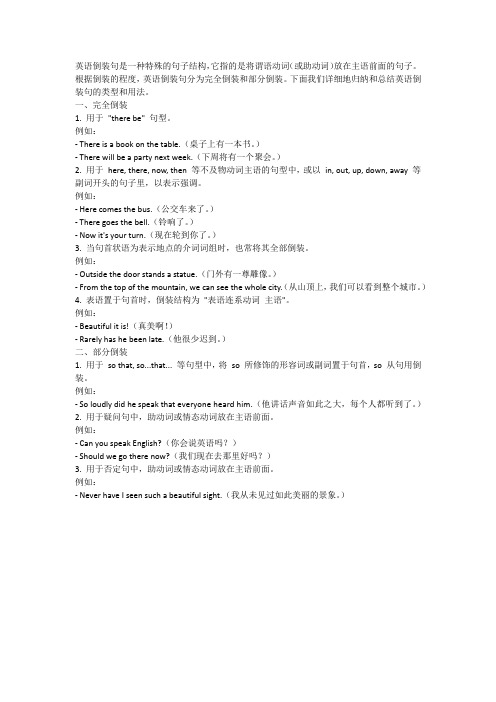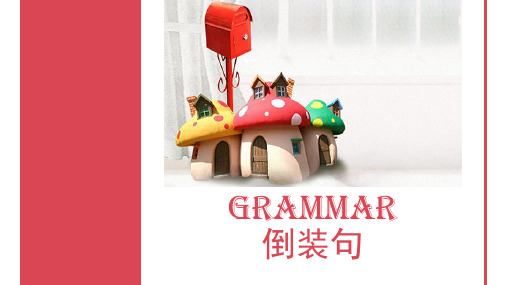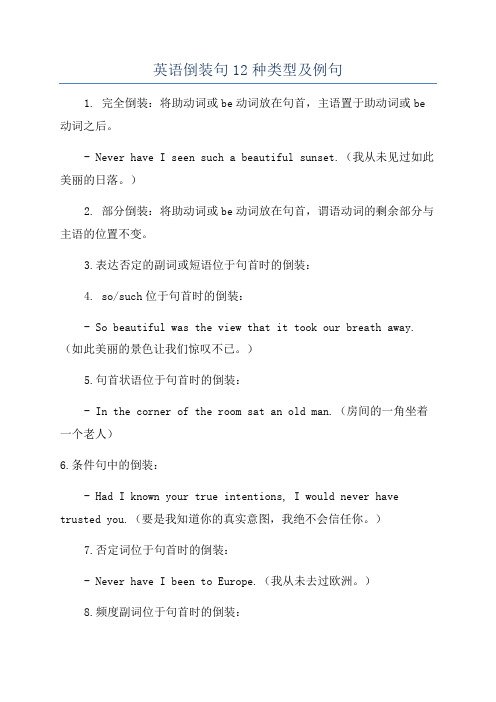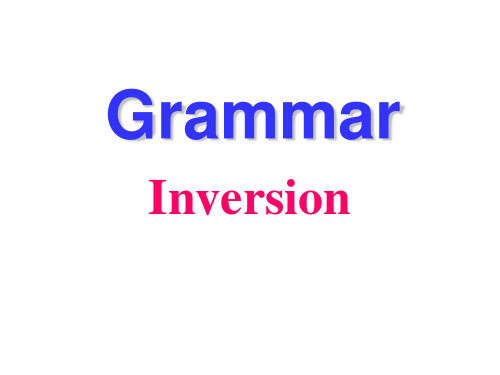英语倒装句12种类型
- 格式:docx
- 大小:38.97 KB
- 文档页数:4

英语语法倒装句有哪些常见的类型倒装句是英语语法中的一种特殊结构,它改变了正常的语序,将谓语动词或助动词放在主语之前。
倒装句在英语中有多种常见的类型,下面将详细介绍每一种类型,并给出相应的例句。
1. 完全倒装句(Full Inversion):完全倒装句是最常见的倒装句类型之一,它将谓语动词完全颠倒放在主语之前。
完全倒装句通常在以下情况下使用:-当以副词或短语开头时,如:never, rarely, seldom, little, not only, only, hardly, scarcely等。
例句:- Never have I seen such a beautiful sunset before.- Rarely does he go out on weekends.-当以地点状语开头时,如:here, there, in, out等。
例句:- Here comes the bus.- Out rushed the children to play in the snow.-当以表示方向的副词或短语开头时,如:up, down, in, out, off等。
例句:- Down fell the rain from the dark clouds.- Off went the alarm, waking everyone up.-当以表示方式的副词或短语开头时,如:in this way, in that case, in no time等。
例句:- In this way can we solve the problem effectively.- In no time did he finish the exam.-当以否定词开头时,如:not, never, seldom, rarely等。
例句:- Not a single word did he say.- Seldom have I heard such beautiful music.2. 部分倒装句(Partial Inversion):部分倒装句是倒装句的另一种类型,它将助动词或情态动词放在主语之前,而谓语动词保持不变。

英语倒装句是一种特殊的句子结构,它指的是将谓语动词(或助动词)放在主语前面的句子。
根据倒装的程度,英语倒装句分为完全倒装和部分倒装。
下面我们详细地归纳和总结英语倒装句的类型和用法。
一、完全倒装1. 用于"there be" 句型。
例如:- There is a book on the table.(桌子上有一本书。
)- There will be a party next week.(下周将有一个聚会。
)2. 用于here, there, now, then 等不及物动词主语的句型中,或以in, out, up, down, away 等副词开头的句子里,以表示强调。
例如:- Here comes the bus.(公交车来了。
)- There goes the bell.(铃响了。
)- Now it's your turn.(现在轮到你了。
)3. 当句首状语为表示地点的介词词组时,也常将其全部倒装。
例如:- Outside the door stands a statue.(门外有一尊雕像。
)- From the top of the mountain, we can see the whole city.(从山顶上,我们可以看到整个城市。
)4. 表语置于句首时,倒装结构为"表语连系动词主语"。
例如:- Beautiful it is!(真美啊!)- Rarely has he been late.(他很少迟到。
)二、部分倒装1. 用于so that, so...that... 等句型中,将so 所修饰的形容词或副词置于句首,so 从句用倒装。
例如:- So loudly did he speak that everyone heard him.(他讲话声音如此之大,每个人都听到了。
)2. 用于疑问句中,助动词或情态动词放在主语前面。
例如:- Can you speak English?(你会说英语吗?)- Should we go there now?(我们现在去那里好吗?)3. 用于否定句中,助动词或情态动词放在主语前面。



英语倒装句12种类型及例句1. 完全倒装:将助动词或be动词放在句首,主语置于助动词或be 动词之后。
- Never have I seen such a beautiful sunset.(我从未见过如此美丽的日落。
)2. 部分倒装:将助动词或be动词放在句首,谓语动词的剩余部分与主语的位置不变。
3.表达否定的副词或短语位于句首时的倒装:4. so/such位于句首时的倒装:- So beautiful was the view that it took our breath away.(如此美丽的景色让我们惊叹不已。
)5.句首状语位于句首时的倒装:- In the corner of the room sat an old man.(房间的一角坐着一个老人)6.条件句中的倒装:- Had I known your true intentions, I would never have trusted you.(要是我知道你的真实意图,我绝不会信任你。
)7.否定词位于句首时的倒装:- Never have I been to Europe.(我从未去过欧洲。
)8.频度副词位于句首时的倒装:- Rarely do we see such dedication.(我们很少见到如此的奉献精神。
)9.祈使句或祈使句部分的倒装:- Stand up!(站起来!)- Be quiet, please.(请安静。
)10. only位于句首时的倒装:- Only by working hard can you achieve your goals.(只有通过努力工作,你才能实现目标。
)11.地点状语置于句首时的倒装:- In the garden were beautiful flowers.(花园里有美丽的花朵。
)12.宾语置于句首时的倒装:- A love like this I have never felt before.(我之前从未感受过如此的爱。

倒装句(Inversion)倒装语序分为“全部倒装”和“部分倒装”。
一:完全倒装。
意思是把整个谓语动词移到主语前面。
在以表方位的副词here, there, out, away, in, up, down, in front of, behind,表时间的副词now, then,等开头的句子中,主谓完全倒装。
There goes the bell.Here comes the bus.Out rushed the students.Away went the boy.Up went the arrow into the air.Up flew the red balloon.Out rushed a tiger from among the bushes.Down the bird flew.Now comes your turn.Then came a new difficulty.Then followed eight years of the Anti-Japanese War.二:部分倒装1.否定词no, never, hardly, not until, seldom, little, 决不by no means=in no way等放在句首,要部分倒装。
我从来没有看过这么糟糕的电影。
=____________________________________________________(倒装句)我很少这么郁闷= __________________________________________________.(倒装句)这个女人是谁他很少知道。
= __________________________________________________.(倒装句)知道晚上很晚他才回来。
= __________________________________________________.(倒装句)这里不仅没有电而且没有水。
英语倒装句12种类型及例句1.完全倒装句:例句: "On the table lies a book."2.部分倒装句(以介词短语、副词或副词短语开头):例句: "In the garden runs a little girl."3.否定副词或副词短语位于句首:例句: "Never have I seen such a beautiful sunset."4. 半倒装句(助动词、情态动词或be动词位于主语之前):5.倒装的祈使句(动词原形+主语):例句: "Go clean your room."6. only位于句首:例句: "Only in her dreams did she see herself as a successful writer."7. so位于句首:例句: "So beautiful was the view that it took my breath away."8. neither/nor位于句首:例句: "Neither did she attend the concert, nor did I."9.如果状语从句放在句首:10.条件从句位于句首:例句: "Should he fail the exam, he will have to retake the course."11.介词短语或副词短语位于句首:例句: "In the corner sat a small dog."12. or/ nor引导的短语或句子位于句首:。
英语中常见的12种倒装结构(1)多数疑问句都是倒装语序.例:Is this raincoat yours? 这件雨衣是你的吗?(2) there be 句型及其变体there live(stand,lie,appear,seem,remain,exist…..等) 中,按语法需要,谓语动词全部位于主语之前,成为倒装语序。
例:there is no longer a particular year in which one goes to work or gets married or starts a family.(美国)不再有一个特定的上学、工作、结婚或成家的年龄。
(3)省去if的虚拟条件从句要采用倒装语序。
例:Were it rain tomorrow , we would have to put off the visit to the Yangpu Bridge.如果明天下雨的话,我们只好推迟参观杨浦大桥。
(4)以so,neither,nor引起的表示和前面句子意思相同的句子用倒装语序。
例:he has been to Beijing.so have I.他去过北京。
我也去过北京。
(5)以here(或there,now,then等)开头且谓语动词是be(或com,go等)句子采用倒装语序。
例:Here are some advertisements about English language training from newspapers.这儿有几则选自报纸的关于英语语言培训的广告。
(6)as引导的让步状语从句用倒装语句。
例:clever as he is,he doesn’t study well.尽管他很聪明却不好好学习。
(7)直接引语前置,名词作引述句主语时用倒装语序。
例:“It is unbelievable!”said a from Guangdong province.一位来自广东的教师说:“这真叫人难以置信”(8) 某些表示愿望的感叹句要用倒装语序。
英语倒装句12种类型
倒装句:英语最基本的语序是主语在前,谓语动词在后。
但有时由于句子结构的需要或表示强调,就要采用倒装形式。
1. 用于 there be 句型.
2. 用于“ here ( there, now, then )+不及物动词+主语”的句型中,或以 in, out, up, down, away 等副词开头的句子里,以表示强调.
注意:
( 1 )主语是代词时,主语和谓语不倒装.
( 2 ) here , there 放在句首通常用一般现在时.
3. 当句首状语为表示地点的介词词组.
4. 表语置于句首时,倒装结构为“表语+连系动词+主语”:
( 1 )形容词+连系动词+主语
Present at the meeting were Mr Li, Mr Wang and many other teachers.
出席会议的有李老师、王老师和其他很多老师.
( 2 )过去分词+连系动词+主语
Gone are the days when we used foreign oil.
我们使用洋油的日子一去不复返了.
( 3 )介词短语+ be +主语
Among the goods are books, exercise-books, pens and some other things.
在所有的货物中有书、练习册、钢笔和其他东西.
5. 用于 so, neither , nor 开头的句子,表示重复前句的部分内容.原句的谓语应与前句的谓语的时态、形式相一致.
例如:You can't speak French. Neither can she.
你不会说法语,她也不会.
6. 为了保持句子平衡,或为了强调表语或状语,或是上下文紧密衔接时.
例如: They arrived at a small village, in front of which was a big river.
他们来到一个小村庄,村庄前面是条大河.
1. 否定副词位于句首时的倒装
在正式文体中,never, seldom, rarely, little, hardly, scarcely, no sooner, no longer, nowhere 等含有否定意义的副词若位于句首,则其后要用部分倒装:
I shall never forgive him. / Never shall I forgive him. 我永远不会宽恕他。
He seldom goes out for dinner. / Seldom does he go out for dinner. 他很少
出去吃饭。
She hardly has time to listen to music. / Hardly does she have time to
listen to music. 她几乎没时间听音乐。
He little realizes how important this meeting is. / Little does he realize how important this meeting is. 他不甚明白这个会议的重要性。
We had no sooner reached the airport than the plane took off. / No sooner had we reached the airport than the plane took off. 我们刚到机场,飞机就起飞了。
(注意)
1 对于not…until句型,当not until…位于句首时,其后的主句要用倒装语序:
He didn’t leave the room until the rain stopped. / Not until the rain stopped did he leave the room. 雨停了之后他才离开这房间。
2 某些起副词作用的介词短语,由于含有否定词,若位于句首,其后要用部分倒装:
On no accounts must this switch be touched. 这个开关是绝不能触摸的。
In [Under] no circumstances will I lend money to him.无论如何我也不会再借
钱给他了。
但是,in no time立即,马上位于句首时,其后无需用倒装语序:
In no time he worked out the problem. 他马上就算出了那道题。
2.“only+状语”位于句首时的倒装
当一个状语受副词only的修饰且置于句首时,其后用部分倒装语序:
Only then did he realize that he was wrong. 到那时他才意识到他错了。
Only in this way are you able to do it well. 你只有用这种方法才能把它做好。
Only when he returned home did he realize what had happened. 当他回到家里时,才知道出了什么事。
3. 在一般疑问句和特殊疑问句中常用倒装句。
例如:
Is Lily singing or dancing?莉莉是在唱歌还是在跳舞?
What does your mother do?你妈妈是干什么的?
4.在以so开头的句子中,使用倒装句式可以使所表达的意思更趋简洁,其汉语意思
为“也”。
例如:He can ride a bike, and so can I. 他会骑自行车,我也会。
She saw it, and so did I. 她看见了,我也看见了。
注意:(1)如果前句的谓语动词是实义动词,倒装结构中用助动词do,does或did;如果前句的谓语中含有be动词、助动词或情态动词,倒装结构中则要根据其主语使用相
应的动词。
例如:
He can do it, and so can I. 他能做到,我也能做到。
He is working hard, and so are we. 他在努力工作,我们也在努力工作。
(2)有时so可以表示对前句内容的进一步肯定,意思相当于“是的;的确如此”,
此时不可使用倒装结构。
例如:
—They will have a good time this evening. 他们今晚会玩得很愉快。
—So they will. 的确如此。
—It’s fine today,isn’t it?今天天气不错,是吗?
—Ah, so it is. 啊!的确如此。
5. 在以neither/ nor开头的句子中,常常使用倒装句式,表示“也不”。
例如:
Tom didn’t watch TV last night. Neither/ Nor did I. 汤姆昨晚没看电视,我
也没看。
They haven’t been to Australia. Neither/ Nor have I. 他们没去过澳大利亚,
我也没去过。
6. 连词as引导让步状语从句时,从句需采用倒装结构,这时往往把动词、形容词、名词、副词或分词提到主语之前。
结构为:名词(不加冠词)/形容词/副词/动词/分词+ as +主语+谓语。
例如:
Young as he is, he knows a lot. 尽管他很年轻,但是他知道很多。
Surrounded as we were by the enemy, we managed to fight our way out. 尽管被敌人包围了,我们还是设法冲了出来。
感谢您的阅读,祝您生活愉快。